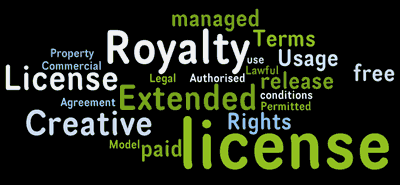If you thought that all the different image license models (RF, rights managed etc.) were confusing as a photographer, spare a thought for the poor designer who has to find images suitable for their needs with a license flexible enough to allow the images to be used in their application.

It sounds simple at first, and as a photographer I rarely take much notice of extended licenses et al, but recently I received a message from a designer who, and I think quite rightly, pointed out that license terms are often as confusing as hell! Having asked a fellow designer for advice he was asked 'did you read the license agreement that came with Microsoft Windows'. It makes an interesting point. You probably don't read software licenses, but if you are using photos for a design and there is the possibility that someone might sue you if you get it wrong, then you might sit up and pay some more attention.
Photographers complain bitterly about images being misused or stolen, but quite happily distribute them on a site that they have not read the end-user usage terms, or even used the interface that end-user sees.
Complicated for Beginners
 It's easy for me to sit here and say that stock photos are to be used in designs, and not resold or sub licensed; and then contradict myself by saying if you want to 'resell' them on a printed product (postcard etc.) then you need to buy an 'extended license'. Microstock opened up a whole market of image users who are 'casual' non-professional designers, often not aware of the details of different license types or technicalities such as model releases.
It's easy for me to sit here and say that stock photos are to be used in designs, and not resold or sub licensed; and then contradict myself by saying if you want to 'resell' them on a printed product (postcard etc.) then you need to buy an 'extended license'. Microstock opened up a whole market of image users who are 'casual' non-professional designers, often not aware of the details of different license types or technicalities such as model releases.
I know it from my experience, I can say a postcard is something that is designed and resold though retail, and that if you find a stock photo and use it in a design for a direct mailing then despite that fact that you might have designed your advertising material as 'postcard' it does not need to be licensed like something that would be resold in the shops.
Terms often stipulate that stock photos cannot be used in 'galleries' or 'upload to websites', but there are plenty of stock photos on the web, and used in things like shopping sites to illustrate generic products. The image gallery in a shopping cart a perfectly acceptable use for a stock photo, but uploading a full sized stock image to a photo gallery somewhere online is definitely not. Where is the line drawn? neither of the images have been uploaded with the intention or resale, or intentionally allowing downloads; but one is legal and one is illegal.
There is no real substitute for reading and understanding the license on a site you are buying/downloading images from, here I offer a little guidance on terms for newbies:
Editorial License
Often used for images without a model or property release. Such images can be used in 'newspaper' like uses. (news websites, magazines, guide books, journals, encyclopaedias etc.) Not suitable for any form of advertising. Editorial images are often those of celebrities or images which feature company logos or identities. (Microstock agencies which allow editorial images)
Standard License (Creative License)
The default for microstock. Can be used in advertisements including online websites and printed materials, often with some caveats on certain subjects. (there are difficult areas using images around 'negative' medical and social issues etc.)
Extended License (Sometimes called 'Commercial')
Allows photos to be used in things like gift products (t-shirts) posters, postcards etc. items which are resold. A limit is often applied on how many products can be produced.
Multi-Seat (Corporate)
This is a licensing option usually applied to image subscription services that allows either multiple users to login or legally allows more than one individual at a company to use downloaded images.
For the most part you don't need to worry about this as a photographer unless you want to restrict the ways in which your images can be sold (extended licenses often attract a higher royalty). Microstock sites often allow opt in for extended licenses allowing sales for both standard and extended as needed by the user. A few allow to you offer editorial images if you have no model release but sales are often less for such images. It's wise to understand your customer and know how to help them through what can (fortunately rarely) become a minefield.
Related Posts
Introduction to Licensing Images



It's quiet in here! Add new comment